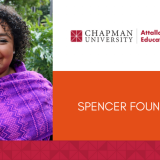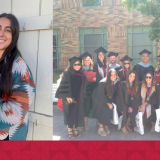
Empowering Voices: Two School Counseling Graduate Students’ Journey to Enhance Family Engagement in Schools
March 19, 2024
In an era where diversity in education demands innovative approaches, two school counseling graduate students from Attallah College of Educational Studies have emerged as beacons of change and inclusivity. Andres Rocha and Taryn Hastie, both passionate about transforming how schools engage with non-English speaking families, recently shared their insights at the past California Association of School Counselors conference (CASC). Their presentation, “Increasing Engagement with Non-English Speaking Families,” not only highlighted the gaps in current engagement practices but also offered a roadmap for more inclusive communication strategies.

Andres Rocha, MA School Counseling ’24, co-presenting at CASC.
Andres Rocha, MA School Counseling ’24: Bridging the Gap
Andres previously served as a dedicated college advisor with the USC College Advising Corps and brought personal and professional experiences into his research. “I became interested in this topic when I began connecting with families…learning that families were instilling the importance of education with their students but were increasingly unfamiliar with how to navigate the education systems in this country,” he explained. Contrary to the stereotype that non-participation equates to a lack of interest, Andres’s work reveals a different narrative. His passion lies in “working with parents to uplift school counseling programs and school communities as a whole,” making school environments more conducive to partnerships with parents.
Highlighting effective engagement strategies, Andres pointed out that providing tools and asking for input from non-English speaking families are crucial steps toward making them active participants in their children’s education.

Taryn Hastie, MA School Counseling ’24, co-presenting at CASC.
Taryn Hastie, MA School Counseling ’24: Cultivating Connections
Taryn Hastie, motivated by her future role as an English-speaking counselor, seeks to make all families feel heard and supported. Her approach to research is driven by the desire to “become better versed in effectively amplifying what families are already doing to support their students.” Taryn’s work at Chapman University’s Student Psychological Counseling Services, alongside her educational journey at Attallah College, has emphasized the importance of connecting with the diverse cultural and linguistic backgrounds of students and their families. Through the guidance of professors Dr. Randelle Kirkemo and Professor Darwin Vega, and inspired by Dr. Stephany Cuevas’s research, Taryn and Andres crafted a presentation that champions cultural sustainability and confronts pervasive stereotypes at the annual CASC conference.
A Path Forward
As both students prepare to graduate in the Spring, their paths reflect a shared commitment to serving communities with empathy and innovation. Andres aspires to return to Long Beach Unified School District, hoping to support low-income BIPOC communities through enhanced parental engagement practices. Taryn looks forward to a career as a school counselor or therapist in Orange County, focusing on supporting students in identifying and achieving their mental health goals.
Their work serves as a powerful reminder of the vital role school counselors and educators play in bridging the gap between schools and non-English-speaking families. Through research, engagement, and a deep commitment to inclusivity, Andres Rocha and Taryn Hastie are not just preparing for their futures—they’re shaping the future of educational engagement in our diverse society.

(L-R): Dr. Randee Kirkemo, Taryn Hastie, Andres Rocha, and Professor Darwin Vega at CASC.

